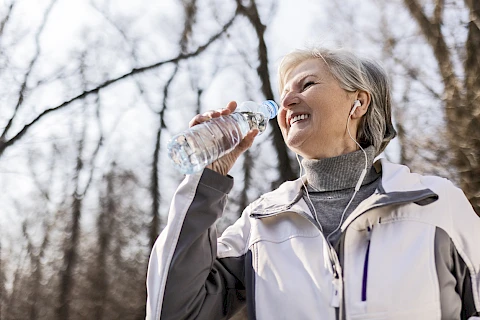
Our body's ability to retain water diminishes as we age, making us more susceptible to dehydration. In the chilly winter months, the risk of dehydration might seem less apparent, yet it is equally crucial. The cold weather can trick us into thinking we don't need as much water, but our bodies require it as much as the summer heat.
Winter Dehydration
During winter, our thirst cues tend to diminish. The lack of sweltering heat doesn't urge us to reach for a glass of water, leading to a common misconception that we don't need as much hydration. However, the truth is our bodies are working hard to maintain warmth, which can lead to water loss through sweating and breathing—often unnoticed due to the cold. For seniors, dehydration poses serious health risks, including confusion, urinary tract infections, and even hospitalization. Be proactive about hydration regardless of the season.
Recognizing Signs of Dehydration
Spotting dehydration early can prevent major health concerns. Seniors might exhibit symptoms such as dry mouth, fatigue, dizziness, and decreased urine output with darker colors. Pay attention to these signs since they can easily be mistaken for other health issues. Mental symptoms like confusion or irritability can also indicate dehydration. Early detection is key, and caregivers can help monitor these signs. Keeping a close eye ensures that seniors' hydration levels are maintained.
Practical Hydration Tips for Seniors
There are several things seniors and their caregivers can do to encourage hydration.
- Set Reminders: It's easy to forget to drink water regularly. Setting alarms or reminders on your phone can be a simple way to nudge yourself.
- Try Different Fluids: Hydration doesn't mean just drinking plain water. Herbal teas, broths, and soups are warming and hydrating. Water-rich foods like fruits can also contribute to fluid intake.
- Routine Integration: Drink water at certain times each day, such as with meals or before bedtime. Linking hydration to routine activities helps reinforce the habit.
With these simple strategies, many seniors find it easier to stay hydrated during the winter.
Encouraging Hydration Habits
Making hydration enjoyable can transform it from a chore into part of your lifestyle. Using technology can be a great way to stay on track. Numerous apps track water intake and send reminders. Smart water bottles are also available that track your consumption and remind you when to take a sip.
Involving family and caregivers can make all the difference. They can also help check that you're staying hydrated and even join you by having their glass of water. This support system can be crucial in maintaining good hydration habits.
Experimenting with different flavors can make drinking water more enjoyable. Try adding a slice of lemon or cucumber to your water. Finding what you enjoy makes it more likely you'll stick with it. Remember, the goal is to make hydration a pleasant part of your daily routine, not a chore.
Get Help With Hydration and More This Winter
Hydration is crucial in maintaining health, especially for seniors during the winter. Learn the signs of winter dehydration, and build hydration into your daily routine. The benefits of staying hydrated are immense, impacting physical health and mental clarity. If you're in the Gastonia, Iron Station, Belmont, McAdenville, or Dallas areas and need more personalized care or support, don't hesitate to reach out to Senior Helpers Gastonia. Our team can help with hydration and provide support with basic tasks and essential care this winter.